The answer is (with an emphasis on hopefully) fifty-three.
The news broke in the early hours of the 29th May that 53 co-signatories had sent an open letter to the Director General of the World Health Organization, Dr Margaret Chan.
It will have been difficult to avoid a newspaper, website, television or radio channel in the UK today without hearing the debate created by this letter.
Why?
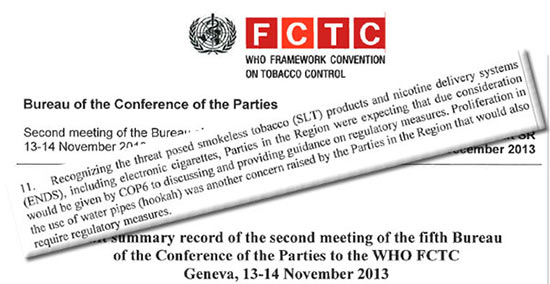
 Back at the tail end of 2013, the FCTC made a couple of very disturbing comments in their leaked minutes of their meeting, planning for the sixth conference.
Back at the tail end of 2013, the FCTC made a couple of very disturbing comments in their leaked minutes of their meeting, planning for the sixth conference.
As can be seen from the excerpts, they take a staunchly anti-vaping approach – not only that, but also a very unscientific bias too.
This amounted to planning a call for categorizing electronic cigarettes in exactly the same way as tobacco cigarettes. It is akin to demanding that fish are classified as elephants because they both use oxygen.
The letter has been sent in advance of the 6th COP meeting in August, this year.
The group sending the letter believe that electronic cigarettes offer a low risk alternative to smoking, that they are a positive development that can reduce the harm of smoking diseases to an estimated 1.3billion smokers around the world and that they have been unfairly dismissed as part of a strategy to reduce preventable disease.
Who signed the letter?
- Professor of Health Behavior and Society. David Abrams, Georgetown University
- Emeritus Professor Geriatric Dentistry, Professor Tony Axéll, Sweden
- Respiratory physician, Professor Pierre Bartsch, University of Liège
- Professor of Health Policy, Professor Linda Bauld, University of Stirling
- Nigel Gray Distinguished Fellow in Cancer Prevention, Professor Ron Borland, University of Melbourne
- Professor of Epidemiology, Professor John Britton, University of Nottingham,
- Director, Chris Bullen, University of Auckland,
- Professor Emeritus André Castonguay, Université Laval,
- Senior Lecturer in Psychology, Dr Lynne Dawkins, University of East London
- Professor Emeritus, Ernest Drucker, Columbia University
- Professor Jean François Etter, Université de Genève,
- Dr Karl Fagerström, Sweden
- Dr Konstantinos Farsalinos, Onassis Cardiac Surgery Center, Athens
- Directeur de l’Institut de Santé Globale, Professor Antoine Flahault, University of Geneva
- Dr Coral Gartner, The University of Queensland,
- Dr Guillermo González, Clínica San Miguel, Madrid,
- Dr Nigel Gray – Member of Special Advisory Committee on Tobacco Regulation of the World Health Organization and Honorary Senior Associate at the Cancer Council Victoria, Australia
- Professor of Clinical Psychology, Peter Hajek, Barts and The London School of Medicine
- Professor Wayne Hall, University of Queensland
- Professor John Hughes, University of Vermont
- Professor Martin Jarvis, University College London,
- Professor Didier Jayle, Conservatoire National des Arts et Métiers, Paris
- Dr Martin Juneau, Institut de Cardiologie de Montréal
- Dr Michel Kazatchkine, Senior fellow, Global Health Program, Graduate institute, Geneva
- Professor Demetrios Kouretas, School of Health Sciences and Vice Rector, University of Thessaly,
- Professor Lynn Kozlowski, University at Buffalo,
- Professor Eva Králíková, Charles University in Prague and General University Hospital in Prague,
- Professor Michael Kunze, Medical University of Vienna,
- Dr Murray Laugesen, Health New Zealand, Christchurch
- Dr Jacques Le Houezec, Consultant in Public Health, Tobacco dependence, Rennes
- Dr Kgosi Letlape, President of the Africa Medical Association, Former President of the World Medical Association
- Dr Karl Erik Lund, Norwegian Institute for Alcohol and Drug Research, Oslo
- Dr Gérard Mathern, Président de l’Institut Rhône-Alpes de Tabacologie, Saint-Chamond,
- Professor Richard Mattick, The University of New South Wales,
- Professor Ann McNeill, King’s College London
- Dr Hayden McRobbie, Queen Mary University of London,
- Dr Anders Milton, Former Chairman of the World Medical Association, Sweden
- Professor Marcus Munafò, University of Bristol,
- Professor David Nutt, Imperial College London,
- Dr Gaston Ostiguy, Institut thoracique de Montréal,
- Professor Riccardo Polosa, University of Catania, Italy
- Dr Lars Ramström, Director, Institute for Tobacco Studies, Sweden
- Dr Martin Raw, University of Nottingham,
- Professor Andrzej Sobczak, Medical University of Silesia, Katowice, Poland
- Professor Gerry Stimson, Imperial College London
- Professor Tim Stockwell, University of Victoria, British Columbia,
- Professor David Sweanor, Division of Epidemiology and Public Health, University of Nottingham,
- Professor Umberto Tirelli, National Cancer Institute of Aviano, Italy
- Professor Umberto Veronesi, Former Minister of Health, Italy
- Professor Kenneth Warner, University of Michigan
- Professor Robert West, University College London
- Professor Dan Xiao, Beijing Institute of Respiratory Medicine,
- Dr Derek Yach, Former Head of Tobacco Free Initiative, WHO (1995-2004)
From this list you can see that the reach stretches across the globe of high-ranking, highly regarded doctors and scientists, some of who have served or still serve with the WHO in some capacity.
Who was the letter sent to as well as Dr Margaret Chan?
- Hail Nikogisian – Head of the Secretariat of the Framework Convention on Tobacco Control.
- Oleg Chestnov – Assistant Director General for Non-Communicable Diseases and Mental Health
- Every World Health Organisation regional office
- The 178 counties belonging to the FCTC (not including the USA or Switzerland)
Why are the group concerned? What was in the letter?
After the leaked minutes were released, Roberto Bertollini (representing the WHO) gave a presentation to the European Parliament that was described as “appalling” in a video by Professor Jean-François Etter. An analysis of why Bertollini and the World Health Organisation were not qualified to lecture on the topic of electronic cigarettes can be read here, from ECITA’s Chief Scientific Officer, Tom Pruen.
The group propose that the World Health Organization stop advocating abstention from all nicotine containing products and treat electronic cigarettes differently as part of a harm-reduction process.
They call for a return to a peer-reviewed, evidence-based, good science approach to policy formation and the notion that reducing risk reduces harm. They propose that by banning e-cigs removes a product of lesser harm and will thereby maintain or increase harm.
It is believed by the group that advocating the banning of e-cigarettes would result in an increase in people using cigarettes and the numbers of cigarettes individuals would consume – which would in turn lead to an increase in smoking related deaths. This runs contrary to the whole ethos of the WHO.
To that end, the group also call for the removal of electronic cigarettes from reduction targets; as by including them (along with cigarettes) people would be encouraged to leave vaping and will in all probability return to smoking.
They say
“As the WHO’s Ottawa Charter states: “Health promotion is the process of enabling people to increase control over, and to improve, their health”. Tobacco harm reduction allows people to control the risk associated with taking nicotine and to reduce it down to very low or negligible levels.”
The letter points out that to ban advertising would lessen public awareness of a safer alternative to smoking and would therefore act as a barrier to people being able to make an informed choice to switch to electronic cigarettes.
It goes on to point out that banning vaping from public places isn’t based on good science and will bring vapers back into contact with smokers and at risk from second-hand smoke.
The letter also demands that an acceptable approach to taxation is taken. Last month a 75% tax was placed on vaping products in New Jersey, the group argue that the tax level should be such that it is an incentive to vape – not a disincentive.
Along with criticizing the bias and malpractice of the likes of Stanton Glantz, it reaffirms that the World Health Organization need to seek out “world class experts” and references those who produced a series of studies between 2005 and 2010.
What impact has the letter had?
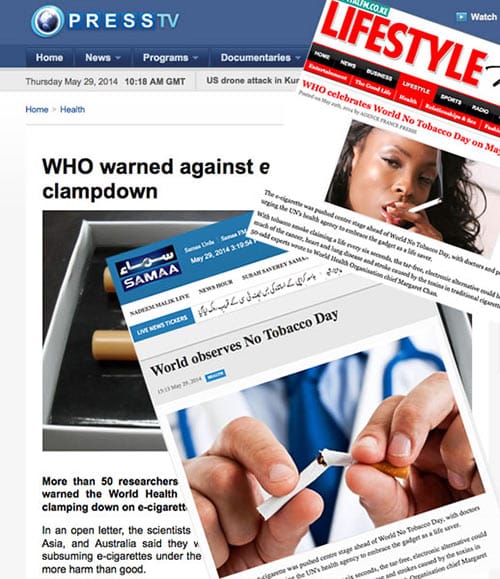
What was noticeable was that electronic cigarettes had become the number one news story in the UK by 9am. It ranked at the top of the list for all the major search engine news sections and (as the images in this article fully demonstrate) was being covered almost everywhere.
Every radio station that carries out phone-ins covered e-cigs as a feature, all the news channels and every national paper.
Critically, it has drawn a line in the academic sand and stated “No more!”
Sources:
A selection of the news coverage
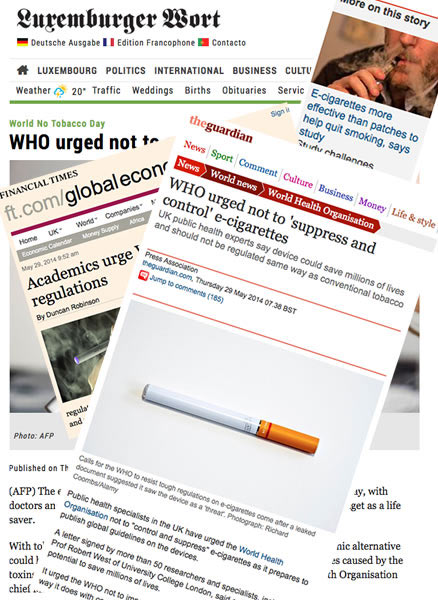
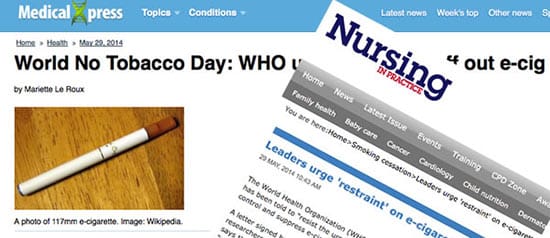
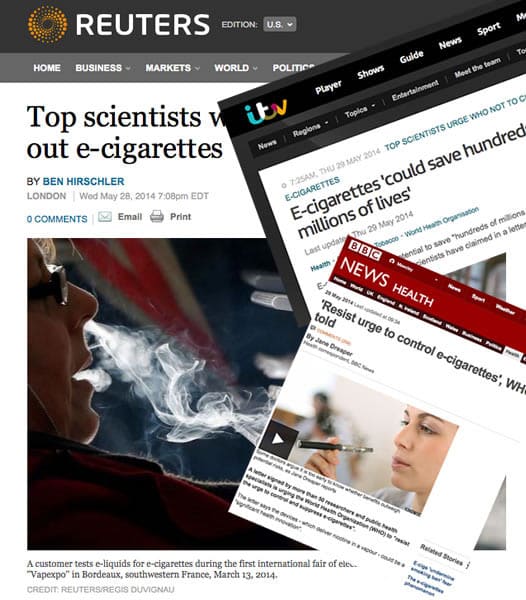




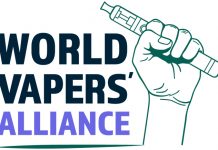

Many years ago I quit smoking for 8 yrs using nic gum. I was very strapped financially[a carton of cigs was a low as $13]. 2 years ago I started smoking again the last yr of smoking I tried using gum numerous time with little success.4 months ago I saw my 75 yr old Mom with an electronic cigarette.The next day I bought a started kit.Have been tobacco free for 4 months.It can really work.